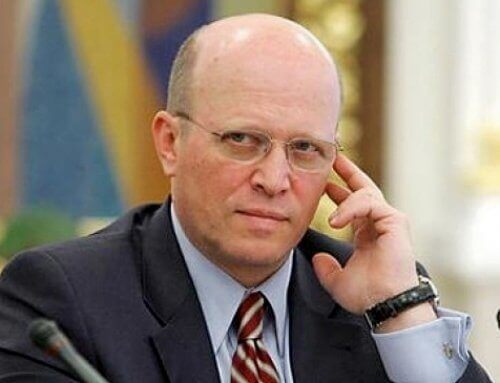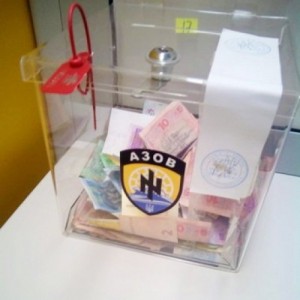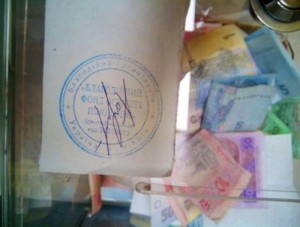Roman Zvarych: without a diploma and conscience
This man, easily recognizable by his ineradicable New York accent, lost his mandate of trust ten years ago – along with his non-existent diploma. After that, Roman Zvarych dropped out of public politics for a long time, so many Ukrainians believed that he had gone back to America. Imagine their surprise when Zvarych’s face materialized behind the back of Andriy Biletsky, the leader of one of the most odious movements in post-Maidan Ukraine. But what could the union of an incorrigible liar and a theorist of the “white race” in the framework of Ukrainian national patriotism produce?
Roman Zvarych. Biography of Pinocchio
Unlike the international landing of “professionals” from the USA, Poland and Georgia, who were welcomed with open arms in Ukraine in 2014-2015, the first wave of “American Ukrainians” of the 90s was received in the homeland of their ancestors without much enthusiasm. No one offered them ministerial positions, they were not considered great reformers, and in general many saw them as CIA agents. Especially in Roman Zvarych, whose murky biography and specific political views gave his opponents many reasons to ask the question: who is he really and why did he come to Ukraine?
Indeed, Zvarych’s entire biography before 1991 is based solely on his own stories, not all of which are true – as was proven by the scandal with his diploma (which was never found). There is even an assumption that Zvarych is an adventurer and swindler who came to post-Soviet Ukraine as a political “carpetbagger” and for this purpose made up a suitable “resume”. There is also an opinion that Zvarych is an American resident and “agent of influence” who lied so much about his past that he mixed up his legends and reality. However, the lack of a clear and plausible version of his origin is Roman Zvarych’s only problem, in everything else he has been quite successful…
If his American passport was real, then according to the data Skeleton.InfoKhvarych Roman Mikhailovich was born on November 20, 1953 in the city of Yonkers (New York State, a northern suburb of New York), where many descendants of immigrants from Western Ukraine live – for this reason, Yonkers has been a sister city of Ternopil since 1991.
But these are the only reliable facts from his early biography – and then the confusing legends begin.
Thus, according to the legend “Zvarych the lawyer”, his father Zvarych Mikhail Petrovich (born in 1926) is a “born American” and a millionaire, since the 60s the owner of the cottage building company “Romhor” and the leasing company “Stemar”. And Roman Zvarych also has a brother Bogdan, who allegedly was the vice-president of a certain “City Bank”. However, according to the legend “Zvarych the nationalist”, his father Mikhail Petrovich has a slightly different biography:

Roman Zvarych: without a diploma and conscience
It is worth noting that the village of Stolovichi does not exist on the available maps of the Peremyshlyansky district of the Lviv region, and in 1942 his father was not 14, but 16 years old. In addition, it is completely unclear what kind of “rebels” in 1942 hid in the forest and pestered the fascists so much that they decided to arrest a young boy who carried lunch for unknown heroes in a basket. And with the fascists, not everything is clear: the fact is that the Lviv region in 1942 was the deepest rear and territory of “Distrikt Galizien”, and patrol service “on the edge of the forest” was then carried out exclusively by the local order police and the security police recruited from the Ukrainians – who detained all sorts of suspicious individuals. At the same time, the police were full of OUN-B members (Banderites), who could only consider their competitors, the “Melnykites”, suspicious. But here’s the problem: it was unrealistic to send someone to a concentration camp for helping the “Melnykites” (and this was done only through the German city Gestapo), because the “Melnykites” collaborated with the Germans even more closely than the “Banderites”. So to whom did young Mikhail Zvarych bring food – and did he bring it at all? But then his son’s imagination lost all boundaries:
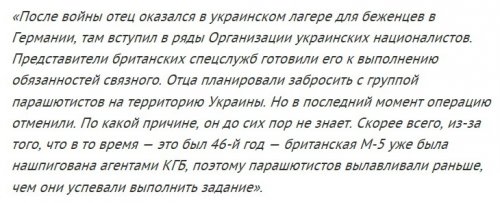
Roman Zvarych: without a diploma and conscience
Here Roman Zvarych was let down by his basic ignorance of the material part: the fact is that the British MI-5 (Military Intelligence) is a counterintelligence service, and therefore it did not drop any paratroopers anywhere, and in 1946 it was enthusiastically fighting the Communist Party of Great Britain and the so-called “Cambridge Five”. Therefore, the participation of Zvarych’s father in the secret operations of Western intelligence services also raises great doubts. Well, this legend ends with a smooth transition to the version of a millionaire father who moved to the USA in 1949 “with five cents in his pocket”, and a few years later he already had his own construction company. However, it is reliably known that Mikhail Zvarych was closely acquainted with several leaders of the Ukrainian diaspora (possibly as a sponsor).
Roman Zvarych also presented in a very intricate manner the biography of his venerable mother Stefania Prokopovna Melnichuk (born in 1933), whom he mentioned precisely under this last name.
Didn’t she really want to take her husband’s surname? Ukrainian journalists never asked Zvarych this question. But he told them more than once that his mother, originally from the Chernivtsi region, went on foot (!) to Czechoslovakia in 1944 together with her mother (Zvarych’s grandmother), escaping from the evil Bolsheviks. And in the period 1946-48 (before emigrating to the USA) they allegedly lived in Germany next door to Stepan Bandera himself, who, to quote Zvarych, “often played with my mother, rocked her on his lap when she was little.” However, let us recall that at that time Stefania Melnychuk was already 13-15 years old, and she would have looked ambiguous on the lap of the leader of Ukrainian nationalism. It seems that her son simply lied here too – within the framework of his clumsy legend “Zvarych the nationalist.”
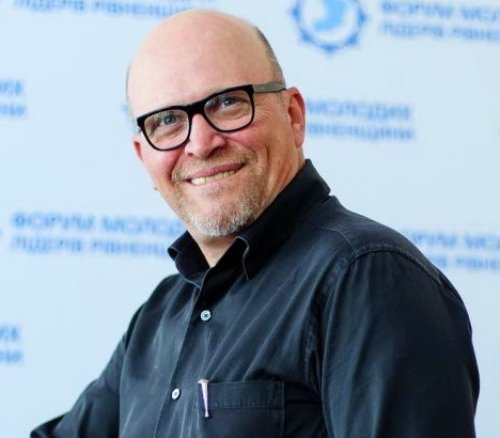
Roman Zvarych
Even more, Roman Zvarych instructed himself in particular, he argued that in adolescence he often fought with local black guys (nearby was Harlem), and in an interview he called them “non -grades”, which was very strange for a person who grew up in the USA – if, of course, he was not a racist. What is unusual for the son of a millionaire, since such schools there are the cheapest of the private ones, and often teach children from poor and dysfunctional families.
Then followed a ridiculous tale about how in 1969 he was a seventeen-year-old boy (in reality, only fifteen) and attended Zbigniew Brzezinski’s lectures at Columbia University, where he caught the eye of Brzezinski. However, at that age, only child prodigies study at universities, and certainly not in Sovietology departments, and Zvarych’s biography states that until 1971 he studied at school, then at Manhattan College, and only in 1976 did he enter Columbia University (fortunately, it is located a few bus stops from Yonkers).
The same biography stated that in 1981 Roman Zvarych allegedly received a master’s degree, and then defended his PhD dissertation (candidate of sciences according to our classification) on the topic of “Ontological foundations of Plato’s ethics” – a very strange topic for the faculty of Sovietology! And then he allegedly continued to work at Columbia University as a full professor. At the same time, he allegedly rented an apartment with a view of Central Park, paying for it from his professor’s salary, sometimes from his father’s money, sometimes by working as a taxi driver – from interview to interview Zvarych’s legend constantly changed. However, after the “diploma scandal” of 2005, Zvarych will declare that he never had a master’s degree or PhD in philosophy, that he only has some “equivalent academic level” (what this is – science does not know), and that in fact he worked at the University only as someone’s assistant – and for free, for the sake of “academic pleasure”.
But journalists have established that Roman Zvarych was expelled from the university in 1978, after which he spent several years hanging around somewhere.
Moreover, a request to Manhattan College about whether Zvarych has a bachelor’s degree (incomplete higher education) in law also gave a negative answer! In short, Mr. Zvarych lied “to the max”, like the fairytale Pinocchio, and he got away with it. And this is not surprising, because his old acquaintances from the “Ukrainian movement” were in power at that time.
According to the legend of “Zvarych the Lawyer”, in the period 1983-1991 he taught political theory, philosophy and legal theory at New York University – and this was recorded in his biography, when Zvarych held the post of Minister of Justice of Ukraine. But according to the legend of “Zvarych the Nationalist”, during this same period he, together with Kateryna Chumachenko (the future wife of Viktor Yushchenko) and the Stetsko spouses, actively participated in the World Anti-Communist League. And then he moved to Germany, where as an assistant for international relations he cultivated the widowed Yaroslava Stetsko (who became the head of the OUN), telling her about how Stepan Bandera rocked his mother Stefania on his lap. There is an opinion that this legend is the most true: allegedly, Mikhail Zvarych, trying to find somewhere to place his idle son (who really loved the good life at his father’s expense), through his acquaintances in the diaspora sent him to the “central department of the OUN” to engage in politics – that is, to travel to conferences and prepare materials for congresses.
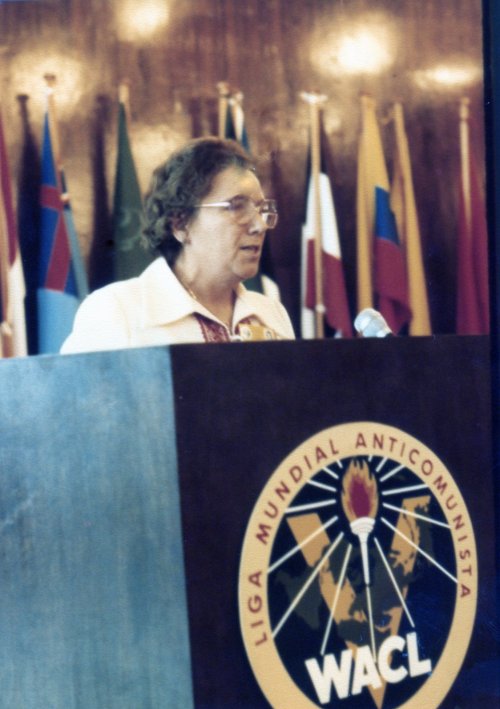
Yaroslav Stetsko at the congress of the Anti-Communist League, 80s
But it seems that Roman Zvarych soon became disillusioned with politics and the “anti-Bolshevik movement”, because in 1989 he reappeared in America, where he got a job at the retraining and professional education courses at New York University, and worked there for two years – which was later confirmed by the official representative of the university, Josh Taylor. He specified that Zvarych worked as a “part-time lecturer” (part-time, evening courses), and the specifics of his work did not require a higher education. That is, Roman Zvarych taught there not the theory of law, but something simpler – for example, he taught beginning students how to best roll up Whatman paper into rolls.
Roman Zvarych. Career in Ukraine
Roman Zvarych even drew his wife Svetlana Viktorovna Kovalevskaya (Zvarych) into his fantasies. In one of his interviews, he stated that he met her in 1983 in… Poland, where, as a representative of the OUN, he met a courier of the “Ukrainian underground” – which was Svetlana. And three years later, they had a son, Bohdan, whose existence Roman Zvarych allegedly learned about only in the early 90s. In fact, the only reliable thing in this melodrama is the year of Bohdan Zvarych’s birth (1986), but as for the detailed biography of Svetlana Zvarych, it is shrouded in the darkness of laconicism. It is only known that she herself was born in 1963, and in 1988 she graduated from the history department of the Taras Shevchenko Kyiv State University, specializing in ethnography – and took academic leave during the birth of her son Bohdan. Whether she was a liaison for some underground organization, whether she traveled to Poland in the 80s, and where she actually met Roman Zvarych, remained “not for the press.” However, there were rumors that Roman and Svetlana met only in the early 90s, and Bogdan was “rewritten” as Zvarych’s son so that the child would have American citizenship in the future.
Some called Roman Zvarych’s move to Ukraine “the sending of a CIA resident,” but there is a simpler version.
The fact is that in June 1991, Yaroslava Stetsko arrived in Ukraine, timing her visit to coincide with the 50th anniversary of the proclamation of the “Ukrainian State” in Lviv, which had been captured by the Germans. There is information that her “assistant for communications” Roman Zvarych, who again received a job in the OUN, arrived with her: to create a political party in Ukraine on the basis of this organization (Stetsko herself, due to her age, could no longer do this). Thus, in 1992, the Congress of Ukrainian Nationalists (KUN) was created, which in essence always remained a dwarf party and a political club of several hundred active members – although it had good funding from the Ukrainian diaspora in Europe and America. Obviously, Zvarych did not have the talent to develop a mass party. But he really liked Ukraine, where he saw many prospects for himself. At least, with his money (or his father’s) and his status as a politician, Zvarych immediately joined the Ukrainian elite – and this was much more interesting than teaching advanced training courses in New York! And ahead of him were the prospects of becoming a businessman and entering power.
It was true that he had trouble with power for a long time. First, Zvarych had to become a citizen of Ukraine: this happened only on January 16, 1995, and he renounced his US citizenship, becoming the first American in the world to exchange his passport with an eagle for a passport with a trident. Many saw this as a sacrificial feat for the love of Ukraine and a manifestation of unprecedented honesty – after all, Ukrainian politicians usually prefer to have 2-3 citizenships, and nothing will force them to renounce Israeli or Swiss. The secret of this “self-sacrifice” is simple: Roman Zvarych is a born American, and can easily restore US citizenship if he wants to.
In 1993, Zvarych created the press center “Elections-94” (in which he himself was unable to participate). And then, together with his wife Svetlana Viktorovna, he founded the “Center for Democratic Initiatives” (1994), in which she became the editor-in-chief of the information and analytical service, and the Center for Democratic Reforms “Demos” (1995), in which Roman Mikhailovich himself took the position of director of the analytical and information service. They never explained why they needed to create two identical clone organizations – perhaps to receive twice as many Western grants.
In addition, being listed in the hopeless KUN, in December 1995 Roman Zvarych joined the “central leadership” of the People’s Movement (NRU), taken there personally by Vyacheslav Chornovol. Very quickly, the “Rukhites” began to gnaw at each other like spiders in a jar, and the first to quarrel were Roman Zvarych and Sergei Odarych, who told journalists the following:
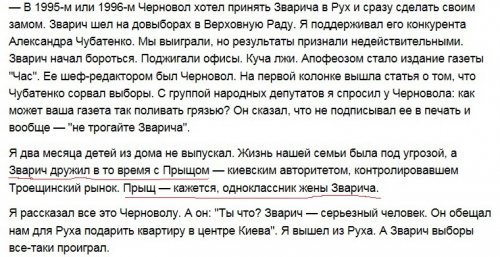
The apotheosis was the split of the NRU in February 1999, aggravated by the imminent death of Vyacheslav Chornovil (March 25, 1999). By that time, Roman Zvarych was already a people’s deputy, having been elected in 1998 on the Rukh list (No. 24). Immediately after the split, Zvarych moved from the NRU faction to the PRP “Reforms-Congress” faction, but a year later he returned to the NRU faction, which was headed by Gennady Udovenko. It is interesting that when Roman Zvarych took an active part in the “right-wing coup” in the Rada (1999), then speaker Oleksandr Tkachenko publicly called him a “CIA agent” – for which Zvarych was seriously offended and demanded a refutation through the court.
But 1999 brought Zvarych more than just exciting political adventures. That same year, his wife Svetlana left her job at Democratic Initiatives and started a new family business.
Thus, the Zvarychs got SIM-Agro LLC (co-founder Svetlana Zvarych), Transit Oil LLC – where Svetlana Zvarych held the position of deputy general director from 1999 to 2006, and NPF Ukrainian National Information Systems – the founder and director of which since 2006 has also been Svetlana Zvarych. After all, Roman Mikhailovich, who went into big politics, was personally prohibited by law from doing business.
So, since 2000, Roman Zvarych actively supported Viktor Yushchenko, and during his time as Prime Minister, the Zvarych family business began to flourish on the re-export of Russian oil to Europe (OOO Transit Oil). This was, of course, more profitable than begging for grants for the “Democratic Initiatives”. In 2002, Roman Zvarych was already elected to the Rada as one of the members of the presidium of “Our Ukraine”, and immediately received the position of deputy chairman of the committee on European integration and a permanent member of the Verkhovna Rada delegation to PACE. The latter also helped the Zvarychs to do their re-export business directly with European partners, without resorting to the help of intermediaries.
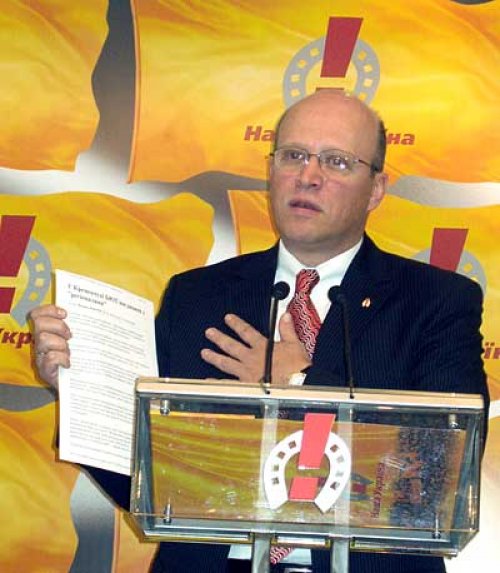
Roman Zvarych in “Our Ukraine”
And so the first Maidan wins, and Roman Zvarych had a hand in that, organizing a group of lawyers who challenged Yanukovych’s victory in the second round of elections in the Supreme Court. It was this penchant for litigation of Roman Zvarych (characteristic of many Americans) that created his image as a great lawyer – and with American universities behind him. As a result, in February 2005, Roman Zvarych became the Minister of Justice of Ukraine, and his short leadership of this department was remembered for two loud scandals. Firstly, having barely started work, Zvarych immediately resigned in protest against the Cabinet’s decision to ban the re-export of oil from Ukraine. There was reason to be upset: at stake was a contract for the re-export of 3 million tons of Russian oil to Slovakia!
The Zvarychi couple began to blame the People’s Party deputy (a fragment of the old Rukh) Igor Yeremeyev, who allegedly wanted to use this oil for a VAT scam. And, despite the fact that the ban on re-export was considered to be in the national interests of Ukraine, President Yushchenko sided with the Zvarychi – they said that Kateryna Chumachenko persuaded him to do so. However, after this incident, the Zvarychi oil business began to wind down.
And then a new scandal erupted, which revealed the unreliability of Roman Zvarych’s official biography and his lies in many interviews. In the spring of 2005, Ukrainska Pravda asked Zvarych to show documents confirming his academic degrees – a confused Zvarych admitted that he did not have any, and then stated that his “doctoral degrees” were supposedly only honorary titles.
Then he was asked to show his diploma – Zvarych replied that… he had lost it. Journalists contacted Columbia University and found out that the new minister not only had no diploma, but no higher education at all! Zvarych and his “lost” diploma became a meme, all of Ukraine made fun of them, many expected his voluntary resignation – and once again Viktor Yushchenko came to the aid of Roman Mykhailovych, giving a long speech about the “spirit of the law” and that it is not the diploma that makes a man. They simply decided to ignore the blatant violation of the law and the shameless lies of the minister – and this greatly tarnished the reputation of the new government. And the government, ignoring public opinion, made Roman Zvarych deputy chairman of the National Commission for Strengthening Democracy and Establishing the Rule of Law. He also became a member of the board of the International Renaissance Foundation (the Ukrainian branch of the Soros Foundation, thanks to whose “grant eaters” Yushchenko came to power)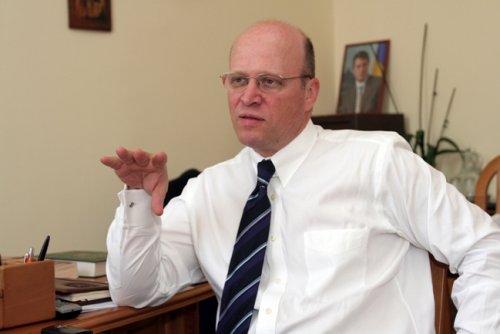
Zvarych resigned only in September 2005, along with the entire Cabinet of Ministers – and headed, oh the irony, the legal department of the Our Ukraine electoral bloc. In the 2006 parliamentary elections, Roman Zvarych was No. 26 on the Our Ukraine list, and after the elections he immediately began creating a coalition of the “orange forces” – and when the process reached a dead end, he probed the issue of creating a “broad coalition” with the Party of Regions on behalf of Yushchenko. For which he was rewarded: on August 4, 2006, he was again appointed Minister of Justice, and in October he became a member of the Supreme Council of Justice of Ukraine – despite his odious reputation as a “lawyer without a diploma.”
And then the Zvarychs mastered a new and promising business: their company “Ukrainian National Information Systems”, “UNIS” (33% belongs to Svetlana Zvarych) began to receive state contracts for software to protect electronic document management. This fed their family even after Roman Mykhailovych resigned again in December 2006 and no longer held high positions. The scale of their activities was eloquently demonstrated by another scandal that broke out in July 2008: at that time, the issue of a tender for a service necessary to create a secure State Register of Voters was being decided, and the amount at stake was about 10 million hryvnia (2 million dollars at the exchange rate at that time). UNIS tried to get this tender, but the Central Election Commission gave preference to the firm “Atlas” – then Roman Zvarych first publicly stated that “Atlas” was connected with Russian structures and “the register will be manipulated by the Kremlin”, and then accused the Central Election Commission of exceeding budget expenditures by more than 2.5 times. Two years later, a new scandal arose around UNI: deputy Viktor Korzh accused the firm of “sawing up” budget funds on an especially large scale.
In 2011, Roman Zvarych was already sitting in deep opposition, cultivating Arseniy Yatsenyuk, and UNIS continued to get into scandals. Another story amazed with the impudence of the swindlers, who were never identified in the end.
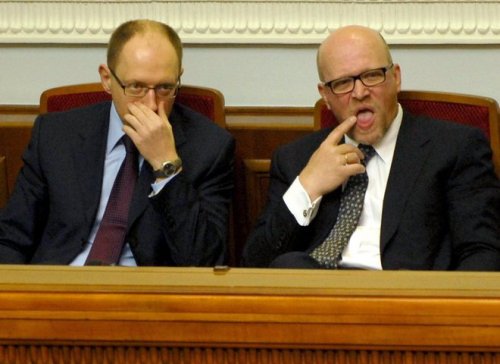
Arseniy Yatsenyuk and Roman Zvarych
So, private entrepreneurs Khaikin Mikhail Lvovich and Zhornitsky Yuri Natanovich, who were the owners of premises on Simferopolskaya Street 17 (city of Dnepropetrovsk), which the company “UNIS” rented from them for years, received a claim that the lease agreement was initially invalid. The reason: Svetlana Zvarych’s statement that her signature on the lease agreement was not hers at all – to which is attached the conclusion of the Kyiv Scientific Research Institute of Forensic Expertise. At the same time, she allegedly did not know that this signature was not hers at all! And therefore Khaikin and Zhornitsky must return to the deceived woman all the money that he secured for the lease of the premises!
Then the show continued in the city Commercial Court, where Khaikin and Zhornitsky proved that the UNIS company had been working in the premises they rented for years, and most importantly, had paid rent! After all, it is logical: if a company pays for office rent (receipts were attached), then it rents them! But then the plaintiff stated that the rent was illegally transferred by the former chief accountant of UNIS, Olga Osipenko, who was thus robbing the company and Svetlana Zvarych personally. And the chief accountant would have been in jail if the case had not been reviewed in the appellate court, which found the claim invalid and an attempt at fraud. But as soon as the case smelled of criminal charges against the owners of UNIS, it was immediately hushed up, and the plaintiff-swindler turned out to be “unknown persons”. How so? Svetlana Zvarych must have quickly discovered that her signature on the statement of claim was also not real!
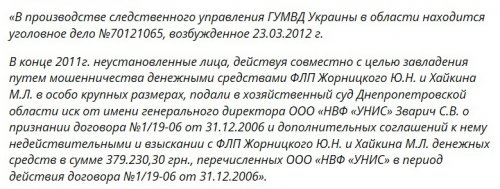
The scandalous business of the Zvarychs brought them a good income: their estates in the villages of Lesniki and Pashkovka were impressive in size. Moreover, Zvarych himself bragged to journalists about his four-story house “150 square meters each floor” back in 2006. Since then, he has grown even more, both in residential real estate and an impressive stable.
“Above all!”
Since 2007, Roman Zvarych has almost disappeared from public politics, and only his move to the BYuT in July 2009 caused a mixed reaction from voters, who called him a “political rat”. However, information has emerged that the real reason why Zvarych “ditched” Viktor Yushchenko, who had been dragging him along for so many years, was his wife’s business. UNIS took over the State Financial Monitoring Service, becoming a monopoly seller of all the keys to the electronic digital signature needed to submit electronic documents – and began to jack up the prices for its keys! In 2010, Roman Zvarych even tried to establish contact with the Party of Regions (and how is he worse than Petro Poroshenko, who became the Minister of Economic Development?), but he failed – and then he went to Arseniy Yatsenyuk. However, Zvarych was also received rather coolly in the “United Opposition”, not even included among the secondary “leaders”. So, during the colossal division of positions and schemes that began after Euromaidan, Zvarych was completely deprived, and even in the early parliamentary elections of 2014 he received an unpassable 84th place.
And then Roman Zvarych… signed up for the Azov battalion. Of course, Zvarych did not take part in combat, and only “showed off” a little in his new camouflage somewhere at a rear base. He talked about NATO standards, opened some “training centers,” and made Napoleonic plans.
But Zvarych had no intention of making a career as a battalion commander in his old age, and instead became the political guardian of Andriy Biletsky. And if the transformation of the Kharkiv Patriot into a battalion, and then the Azov regiment, took place thanks to the guardianship of the head of the Ministry of Internal Affairs Arsen Avakov, who covered for Biletsky (and used the services of his “national titushki”) back in his time as governor, then Roman Zvarych had a large hand in the creation of the so-called Azov Civil Corps. And he was one of the first to use it in his own interests. Already in the summer of 2014, numerous donation boxes appeared in Kyiv “to help the heroic defenders” with the emblems of Azov and the seals of a certain “Charitable Foundation for Educational Innovations”. As journalists found out, this fund belongs to the Zvarych family structures and has been declaring its volunteer activities since 2014. However, there is no information that the money collected was sent to its intended purpose or spent on purchasing equipment for Azov. Skeleton.Info could not be found.
And there’s more. According to some sources, the “money” was collected by Zvarych Jr., Bogdan, who had a passion for cars since his teenage years and was personally involved in tuning them. His passion would not have attracted any attention from the media, if not for the events around the Kyiv plant “ATEK” (former “Red Excavator”). This enterprise was deliberately bankrupted a long time ago, and it was not about the plant itself, but about the territory it occupied, for which the largest developers of Kyiv competed. In fact, their dispute did not allow one to take over the enterprise. And suddenly, in November 2014, “ATEK” was seized by young people in camouflage with recognizable emblems of the Civil Corps “Azov”, who said that the enterprise was confiscated by “patriots” for the needs of the defense of Ukraine – allegedly it would repair equipment for the ATO. According to the CEO of ATEK, Igor Usenok, the raider takeover was carried out by people acting in the interests of the Charitable Foundation for Educational Innovations and other firms of the Zvarych family, which are also participating in the division of the enterprise. That is, pure raider takeover.
After the seizure of the enterprise, it was announced that the creation of an Azov base on its territory would also include a repair shop.
But, apparently, this was not enough to justify the raider takeover of the plant, and then in the summer of 2015, the “Azovets” project emerged: some unique heavy armored vehicle based on the T-64, designed by “patriots and volunteers of Azov”, assembled in the “ATEK” workshop, and being prepared for testing and serial production. The scam was based on the expectation that no one would dare to kick out the “patriots” who were manufacturing “unique equipment for the ATO” at the plant – not even the president himself! And the calculation was justified. And so, having dragged an engineering vehicle (an armored bulldozer) based on the T-64 to the plant, the “Azov” kulibins began to weld a new armored hull onto it and stick a “combat module” with a twin GSh-23, brought from the front lines, onto it. As the people say – “wunderwaffe”. This process was accompanied by numerous scandals: the vehicle was molded from what was available – that is, old hardware, electronics from Chinese toys and optics from an intercom. At the same time, it was stated that the finished vehicle would cost 5 million dollars (almost like the Israeli Merkava-4 and the German Leopard-2) and it was time for the state to allocate money for serial production. As is known, the venture ended in nothing: the tank was sent “for testing” and disappeared somewhere, but the Azov base on the captured ATEK remained.
So, during this six-month epic with the creation of the “Azovets”, expensive cars were repeatedly noticed next to it in the plant’s workshop, some in a state of cosmetic repair. In this connection, two logical explanations arose: either these were stolen “cars”, or Bogdan Zvarych set up his own car tuning center in the “ATEK” workshop. And then it is quite understandable why the “Azovets” took so long to make and was made so clumsily.
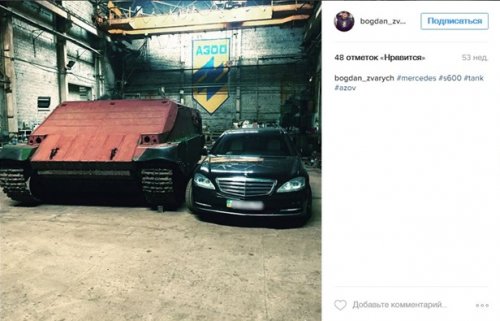
wunderwaffe Azovets
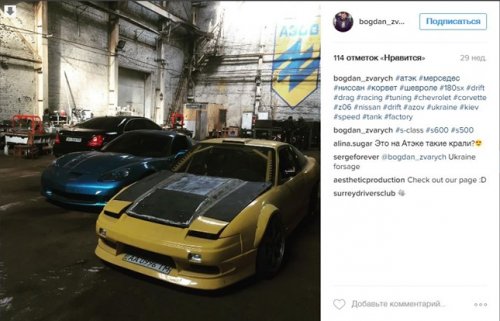
By the way, sources also reported that during 2014-2015 Bohdan Zvarych was formally listed as a volunteer of the National Guard, but never showed up at a military unit. Perhaps, being assigned to the same Azov regiment, he “defended the homeland” in Kyiv, installing neon lights on sports cars.
Meanwhile, his father was working on creating a full-fledged political party on the basis of the Azov Civil Corps, and allegedly this was a personal wish of Arsen Avakov, who, after the political collapse of the People’s Front, needed a new promising party capable of getting into parliament. And judging by the results, Roman Zvarych failed to cope with the task.
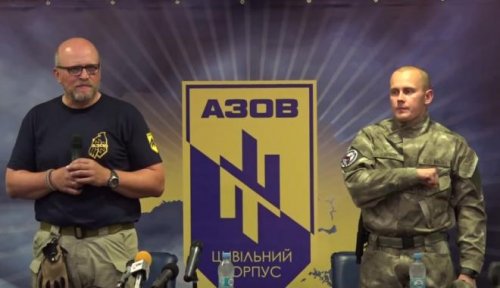
Today, the Azov Group is the largest organization of “political titushki”, with thousands of members. They are the only ones who openly recruit young people in cooperation with the authorities, and the only ones who have a strong “roof” in law enforcement agencies (at the level of the Minister of Internal Affairs). Therefore, the Azov Group has no competition in solving the problems of “organizing a Maidan” or “dispersing the Maidan”. In fact, Avakov and other important figures of the “People’s Front” have gained full control over the “unconstitutional” overthrow of the government – both at the local level and on a national scale in Ukraine. However, the Azov Group remains unpopular among the broad masses of Ukrainian voters – which means that the chances of the “National Corps” party created on its basis are not much greater than those of other right-wing radical marginals. Azov does not have bright public politicians, like Svoboda – and therefore, in the elections, supporters of nationalism will cast their votes for the usual Tyahnybok, rather than the incomprehensible Biletsky. And this is the biggest failure of Roman Zvarych – he will certainly be held accountable for the huge funds invested in the political promotion of Biletsky and the Azov State Committee. The fact that Roman Zvarych’s position has been shaken is evidenced by his absence from the presidium of the National Corps and his less frequent and close contacts with Biletsky, whom he recently followed like a shadow. However, what would it cost him to invent a couple more fantastic stories to justify himself?
Sergey Varis, for Skelet.Info
Subscribe to our channels in Telegram, Facebook, CONT, VK And Yandex Zen — only dossiers, biographies and dirt on Ukrainian officials, businessmen, politicians from the section CRYPT!

